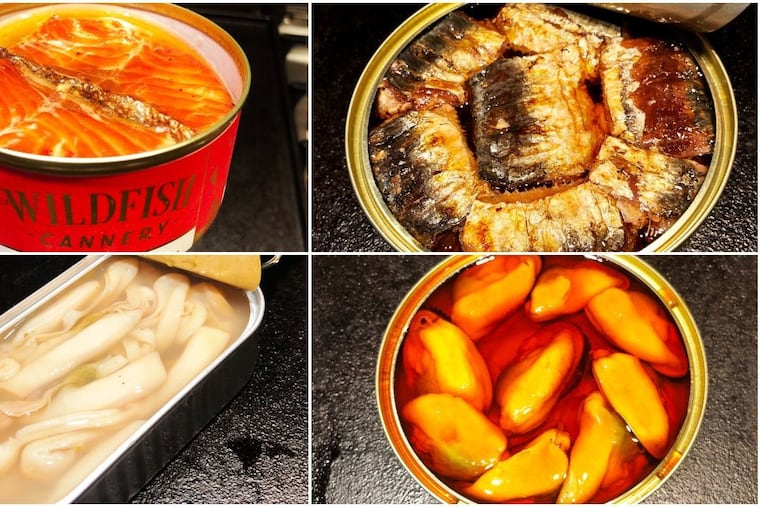Where to buy and taste excellent tinned fish in Philly
Craig LaBan tasted two dozen cans of tinned seafood. Here are the highlights

The fancy tinned fish trend has landed in Philly big time, from various markets around town to restaurants, distillery tasting rooms, and bottle shops that sell them retail. Here are the highlight cans from my tasting of two dozen examples.
Conservas Braseadas Güeyu Mar sardines, $20 a 3.7-oz. can at Herman’s Coffee (1313 S. Third St.): Pretty much all the seafood that originates from this small cannery connected to chef Abel Álvarez’s beachside restaurant in Asturias is exceptional, and these fish — plump, silvery, and scented with Iberian smoke — were easily among the most memorable seafood things I sampled during my snow day tasting from Herman’s. They were so good, I would consider one day splurging for Güeyu Mar’s octopus or grilled tuna necks, which can exceed $40 a can. This line is also available at Bloomsday Cafe, whose co-owner Zach Morris called the brand “magic.”
Les Mouettes d’Arvor sardines, $9 a 4-oz. can at Herman’s Coffee: Only fish from boats that dock within five miles of the cannery are used at 62-year-old Les Mouettes d’Arvor in Concarneau, which specializes in French presentations of sardines, mackerel, and anchovies. And the freshness of the Brittany coast was captured in every can I’ve tasted, from the red pepper and citrus in olive oil flavor to the tin of sardines packed in local sea salt and butter that turned golden when I warmed the can briefly in the oven. Di Bruno Bros. also carries some of this line, as does Riverwards Produce (2200 E. Norris St.), which sells the cannery’s collector tins of La Molènaise sardines from France ($7.99 for 4 oz.), whose vintage design is a nod to the film Les Seigneurs by Olivier Dahan.
José Gourmet from Portugal is one of my favorite brands, in part for the whimsical illustrated artwork on its boxes, but also for its exceptional quality. The octopus in garlicky oil was tender and full of flavor ($19 at Herman’s Coffee), and easily could have passed for an expert restaurant effort. But José's little squid ($13.99 at Di Bruno Bros.) are a true marvel of cephalopod delicacy, their tiny heads stuffed like a sausage with rice then stewed in a savory spiced tomato ragout.
Espinaler Razor Clams ($11 a 4-oz. can at Herman’s Coffee): This renowned 125-year-old cannery from just north of Barcelona is one of the leaders in high quality tinned seafood, as well as for its famous “appetizing sauce,” which is more tangy that hot. Its canned clams are exceptional. A white box of its “premium” line cockles were tender and briny, with enough juice to make a perfect plate of pasta. I’m partial, though, to the meatier baton-shaped razor clams. If you can find them, the larger “untrimmed” razors come in a richer, brinier broth.
Patagonia Provisions mackerel with Spanish paprika in oil ($7 for 4.2-oz. can at Herman’s Coffee): The clothing manufacturer is known for touting sustainability and a charitable mission with its tinned seafood products, and smoked mussels are its best seller. I was especially impressed, by the meaty and mild mackerel packed in vivid orange oil.
Ramón Peña giant fried mussels in escabeche ($12 a 3.9-oz. can at Herman’s Coffee): I don’t always love the silty texture of some tinned mollusks, but the fried mussels from renowned Galician canner Spain’s Ramón Peña had a perfect tenderness in the red pepper zing of its tangy escabeche marinade, I ate the whole can. Selections from this line are also available at A Taste of Spain in the Reading Terminal Market.
Wildfish Cannery king salmon ($12 a can at Herman’s): The king salmon Alaskan cannery is the epitome of an artisan product. It’s so vivid, a fragrant puff of alder smoke practically emerges the moment you open the can to reveal a chunk of moist, brick-red flesh.
Conservas Ortiz white ventresca tuna ($17 a 3.8-oz. can at Di Bruno Bros.): This was the most I’ve ever paid for a tin of tuna, but the buttery richness of the flaky belly meat inside was stunning, the canned Spanish answer to o-toro tuna sushi. The standard bonito del norte albacore cans from Ortiz ($7) are also worth the upgrade over the usual supermarket bargain cans.
Cantabrian anchovies ($14 a plate at Pizzeria Beddia): If you’ve only had the brackish mush of standard pizza anchovies, you’re in for a flavor and texture revelation with plump, dusky fillets of prized brown anchovies from the Cantabrian coast in Northern Spain. Joe Beddia serves them alone as an appetizer on a plate glossed with Arbequina olive oil at his pizzeria because they are a singular “experience like Parmesan — so savory.” (He uses Sicilian anchovies on his pies). Cantabrian anchovies come in many levels of quality, but the Donostia brand ($10 a 3.17-oz. jar at Herman’s) is recommendable. Ortiz Spanish anchovies ($15.99 a 3.3-oz. jar at Di Bruno Bros.) are also exceptional.